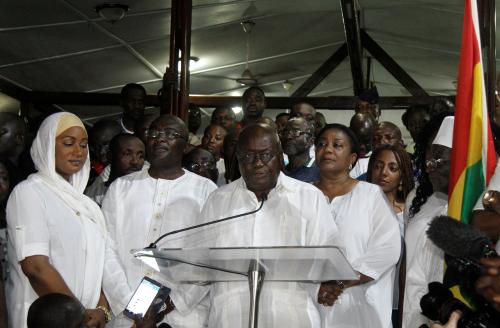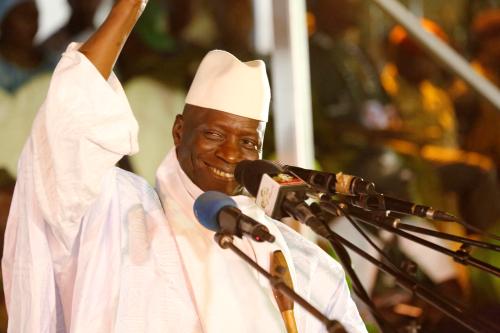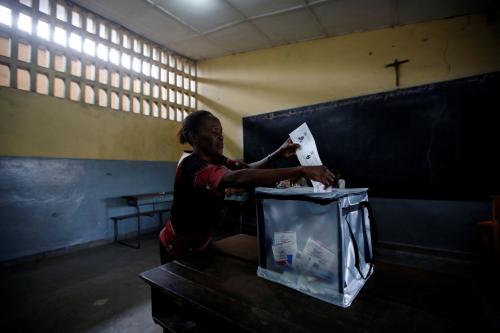Last week, Ghanaians set out to elect their next president: They had to choose between incumbent President John Dramani Mahama and six other candidates, including former foreign minister Nana Akufo-Addo, who was considered the strongest challenger to the president. In a surprising result, Akufo-Addo defeated Mahama by more than one million votes. Akufo-Addo received 53.85 percent and Mahama 44.40 percent. The next closest challenger was Paa Kwesi Nduom of the Progressive People’s Party, who only received 1 percent of the votes.
Of greater importance, though, is the fact that Ghana has continued to uphold the tradition of peaceful elections and regime change that emerged in the country in the early-1990s. Of course, political transitions in Ghana have not always been peaceful—the country suffered a series of military interventions in governance from 1966 until 1981. Although it is located in a region that has a notorious history of military intervention in politics, Ghana was one of the first countries in West Africa to join the prodemocracy movement that swept the continent in the early 1990s. Since then, the country has led the continent in peaceful transfers of power and the institutionalization of democratic rule. Indeed, since 2000, Ghanaians have three times voted out of office an incumbent government in highly contested, but fair, peaceful, and credible elections.
A quick political history
Ghana gained independence from the United Kingdom on March 6, 1957 with Dr. Kwame Nkrumah as its first prime minister. Following a constitutional referendum in 1960, Ghana became a republic with Nkrumah as its first elected president. Six years later, though, on February 24, 1966, the Ghanaian military intervened and overthrew Nkrumah’s government. This action was the first signal that the military would remain an integral part of the country’s political economy, with a number of coups d’état, until the democratic transformations of the early 1990s. In November 1992, Jerry John Rawlings of the National Democratic Congress, a former military ruler, won the presidential elections and took the oath of office in January 1993. He would win again in 1996 and rule through 2001. In 2001, Ghana experienced its first change of government through multiparty elections when John Agyekum Kufuor of the New Patriotic Party won the 2000 elections and was inaugurated president on January 7, 2001. He ran for re-election in 2004 and emerged victorious and served until 2009.
The important 2008 and 2012 elections
On December 7, 2008, presidential elections were held but no candidate received the 50-percent-plus-one vote of the votes needed to avoid a run-off election. The run-off election was held a few weeks later between Nana Akufo-Addo and John Atta Mills, the two candidates who had received the most votes. The Electoral Commission of Ghana (ECG) certified Mills the winner in an election that is considered the closest in the country’s history. Mills went on to form a government in January 2009 but died in office in 2012 and was replaced by his vice president, John Dramani Mahama.
Ghana’s 2008 presidential election was closely watched by the international community in light of the discovery of oil in the country and subsequent prospects for significant improvements in public revenues.
Ghana’s 2008 presidential election was closely watched by the international community in light of the discovery of oil in the country and subsequent prospects for significant improvements in public revenues. Perhaps more important were evolving political events in other African countries: There were allegations of electoral fraud, which produced significant levels of sectarian violence in Kenya (2007/2008) and Zimbabwe (2008), and there were military coups in Mauritania (2008) and Guinea (2008), all events that threatened the peace and security not only of these countries but also other parts of the continent. With respect to Ghana, there was fear that these events could have significant impact on the country’s election in particular and political system in general, damaging what had been steady steps towards the deepening and institutionalization of democracy in the country. The ECG managed the elections effectively, though, and Ghanaians accepted the results. Importantly, unlike the post-election situations in Kenya and Zimbabwe, there was no post-election violence in Ghana.
On December 7, 2012, Ghana held its next presidential election. Competing for the presidency in this election were the incumbent president John Dramani Mahama of the National Democratic Congress (NDC) and the opposition leader, Nana Akufo-Addo of the New Patriotic Party (NPP). The incumbent was declared the winner by just 50.7 percent of the vote. Although many regional and international observers adjudged the elections free, fair, and credible, the opposition alleged that the ECG had engaged in electoral malpractices and took its case to the Ghana Supreme Court. The court upheld the December 2012 election results, clearing the way for Mahama to become president of Ghana. There was no sectarian violence.
Ghana’s 2016 presidential election is held in the midst of unrest in the region
Ghana is a relatively stable democratic country in a region that has, during the last several years, been plagued by significant levels of political instability, most of which is related to sectarian violence. For example, countries such as Sierra Leone, Côte d’Ivoire, and Liberia have been recovering from brutal civil wars. Islamist militant violence continues to threaten the peace in Mali and Burkina Faso, and Boko Haram remains a major threat in Nigeria and several neighboring countries. In Guinea, the political system remains extremely fragile and vulnerable to collapse. And then, there is concern about very recent evolving political events in The Gambia: Just last week, Yahya Jammeh, The Gambia’s long-time president, conceded defeat to opposition leader, Adama Barrow, vowing to end his 22-year rule and make way for a new crop of leaders to move the country forward. Just one week later, however, Jammeh retracted his statement, rejected the results of the election due to what he claimed were “unacceptable abnormalities,” and demanded a new election. This reversal has threatened the peace and thrown the country into a political quagmire. The events in The Gambia and the political fragility that continues to plague the region make a smooth and peaceful transition in Ghana very important.
Magnanimity in defeat and humility in victory
When it became clear that he had lost the election, incumbent President Mahama quickly accepted his loss and conceded, paving the way for the winner to begin the peaceful transition process. In a nation-wide address to the country, the president announced that he had called Akufo-Addo to congratulate him for his victory. In his concession speech, Mahama emphasized the belief that “each victory belongs to the people . . . and that the true winner is always Ghana.” He went on to state that despite what he believes were “irregularities associated with the election,” he decided that it was in the best interest of the nation for him to concede and ensure the “sustenance of . . . [the] country’s democracy.” He noted that “[n]otwithstanding our diversity, religious faiths, ethnic groups and political affiliations, we have always recognized that we are all, ultimately, on the same side—the side of Ghana and its progress.” Unlike elsewhere on the continent, Mahama appealed for tolerance, unity, and peace, and warned fellow Ghanaians of the devastation visited on many countries that have been pervaded by religious and ethnic intolerance. He said that while he “would have cherished the opportunity to [lead the country again], he would “respect the will of the Ghanaian people” and help the incoming government guide the country’s development. Hence, a lesson that we can learn from the 2016 Ghanaian election is respect for the “will of the people” when they have spoken through fair, free, and credible elections, as well as fidelity to the rule of law and the country’s democratic institutions.
However, like most economies that are highly dependent on primary commodities, Ghana’s economy has suffered significantly from the sharp decreases in the prices of oil and other commodities (notably gold and cocoa) during the last few years.
While his opponent was magnanimous in defeat, Akufo-Addo was humble in victory. The in-coming president appealed to all Ghanaians to help him “get Ghana working again,” a reference to deteriorating economic conditions that began with falling prices for its main exports, primarily gold, oil, and cocoa, as well as significant increases in the public wage bill. During the 2016 presidential election, the country’s faltering economy emerged as the most important campaign issue and perhaps, the determining factor for the opposition candidate, Nana Akufo-Addo, who in his campaign speeches, promised to revitalize the economy and create more jobs by significantly increasing the country’s manufacturing capacity. The opposition took effective advantage of the slowdown in the country’s economy and accused the government of mismanagement and incompetence. Now, the incoming NPP government will inherit an economy which, until 2014, was considered one of the most progressive in Africa. However, like most economies that are highly dependent on primary commodities, Ghana’s economy has suffered significantly from the sharp decreases in the prices of oil and other commodities (notably gold and cocoa) during the last few years. In Ghana’s case, the significant increases in public sector workers’ wages and salaries only worsened the situation. An important lesson to learn from this election is that the opposition won the election by appealing not to sectarian interests as is common in elections in many African countries, but to the issues that affect the entire country and its citizens.
While there are many reasons to explain why Ghana managed to avoid sectarian violence in the post-election period, the most important contributing factor to the country’s peaceful transition remains the magnanimity of the loser and the humility of the winner: Both leaders’ “democratic” behavior and their unwillingness to exploit ethnocultural differences to gain political power contributed significantly to the establishment of a political environment that enhanced peaceful transition and effectively pre-empted any efforts by disgruntled followers to engage in violence. In the end, Ghana and the region are the true winners of this election. Ghanaians, of course, must be granted credit for having collectively decided, since the early 1990s, to accept and respect their democratic institutions and live under a political system undergirded by the rule of law. In fact, since the end of military rule in 1992, there have been seven peaceful presidential elections.
Special lessons for African political elites
The behavior of both Mahama and Akufo-Addo as well as their supporters, after the election, has further solidified Ghana’s credentials as a country determined to strengthen its democratic institutions and enhance its ability to live by the rule of law. As other African countries prepare for presidential elections, they can learn a lot from Ghana. Kenyans, for example, can take a lesson from Ghana on how to behave in the event they lose an election. President Jammeh of The Gambia should see in Ghanaian President Mahama’s concession speech a genuine desire to serve his country and promote the peaceful coexistence of all Ghanaians. Perhaps Jammeh could learn about public service from the Ghanaians and save his country from continued political and economic trauma by stepping down and allowing a new generation of leaders to move the country forward. For other African political elites, from Pretoria to Cairo and from Dakar to Nairobi, the lesson is clear: Ghanaian leaders’ fidelity to democratic institutions is a more effective way, than political opportunism, to ensure peace and security, as well as political and economic development.







Commentary
The Ghanaian elections: 2016
December 15, 2016